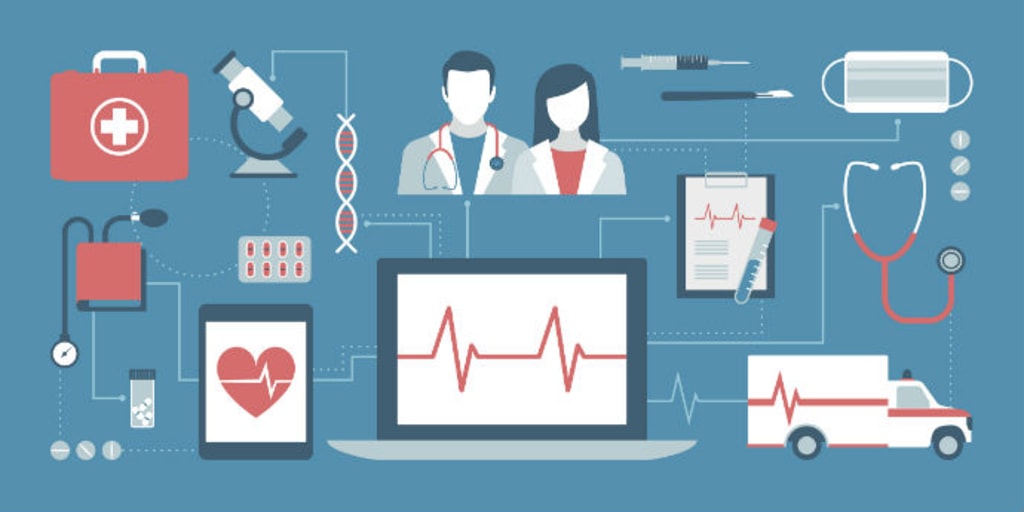"Unlocking the Digital Health Frontier: A Transformative Journey"
Digital health tools

In the ever-evolving landscape of healthcare, the rise of digital health tools has been a game-changer, revolutionizing the way we approach wellness, diagnosis, and treatment. From wearable devices that track our vital signs to AI-powered chatbots that provide personalized health advice, these technological advancements have not only enhanced our understanding of our own bodies but have also empowered us to take a more proactive role in managing our healthcare.
One of the most remarkable aspects of digital health tools is their ability to bridge the gap between patients and healthcare providers. Gone are the days when a doctor's visit meant a lengthy wait in the office and limited face-to-face interaction. With the advent of telemedicine and remote patient monitoring, individuals can now consult with medical professionals from the comfort of their own homes, facilitating more frequent and personalized care.
Moreover, the integration of artificial intelligence (AI) and machine learning into digital health platforms has revolutionized the way we approach diagnostic and treatment processes. These advanced technologies can analyze vast amounts of data, quickly identify patterns, and provide healthcare professionals with valuable insights, leading to more accurate and timely diagnoses. This not only enhances the overall quality of care but also streamlines the healthcare system, reducing the burden on both patients and providers.
But the transformative power of digital health tools extends far beyond the clinical setting. These tools have also empowered individuals to take charge of their own health, fostering a greater sense of autonomy and personal responsibility. From fitness trackers that motivate us to stay active to mobile apps that help us manage chronic conditions, the digital health landscape has created a paradigm shift in the way we approach our wellbeing.
One particularly noteworthy aspect of digital health tools is their ability to provide personalized and tailored solutions. By leveraging data-driven insights and machine learning algorithms, these technologies can offer customized recommendations and interventions, catering to the unique needs and preferences of each individual. This level of personalization not only enhances the effectiveness of healthcare but also encourages greater engagement and adherence, ultimately leading to better health outcomes.
Furthermore, the rise of digital health tools has amplified the reach and accessibility of healthcare, particularly in underserved or remote areas. Through telemedicine and mobile health applications, individuals who might have previously faced geographic or socioeconomic barriers to accessing medical care now have the opportunity to receive high-quality healthcare services, regardless of their physical location.
As we delve deeper into the digital health frontier, it's essential to recognize the potential challenges and ethical considerations that come with these advancements. Issues such as data privacy, security, and the equitable distribution of these technologies must be addressed to ensure that the benefits of digital health are accessible to all. Regulatory frameworks and ongoing collaboration between healthcare providers, technology companies, and policymakers will be crucial in navigating these complexities and ensuring that digital health tools are developed and deployed in a responsible and ethical manner.
In conclusion, the digital health revolution is a remarkable transformation that is reshaping the way we approach healthcare. From enhanced patient-provider interactions to personalized care solutions and improved accessibility, these technological advancements have the power to improve health outcomes, empower individuals, and ultimately, create a more efficient and effective healthcare system. As we continue to navigate this exciting frontier, it is our collective responsibility to harness the potential of digital health tools in a way that truly benefits individuals and communities, paving the way for a healthier and more sustainable future.
In the ever-evolving landscape of healthcare, the emergence of digital health tools has revolutionized the way we approach patient care and disease management. These innovative technologies have become indispensable components in the arsenal of healthcare providers, offering a comprehensive suite of solutions to address a wide range of medical needs.
One such digital health tool is the electronic health record (EHR) system, which serves as a centralized hub for patient data. EHRs facilitate the seamless storage, retrieval, and sharing of medical information, enabling healthcare professionals to make informed decisions and provide personalized care. Additionally, telehealth platforms have revolutionized the delivery of healthcare services, allowing patients to access remote consultations and receive treatment from the comfort of their own homes, particularly during the recent global health crisis.
Furthermore, the rise of wearable devices and mobile health applications has empowered patients to take a more active role in managing their own health. These tools provide real-time monitoring of vital signs, physical activity, and other health metrics, allowing individuals to track their progress and make informed decisions about their well-being. The integration of these digital health tools with healthcare systems has also enabled the early detection of potential health issues, leading to timely interventions and improved patient outcomes.
The adoption of digital health tools has not been without its challenges, however. Concerns surrounding data privacy, security, and interoperability must be addressed to ensure the safe and effective use of these technologies. Nonetheless, the potential benefits of digital health tools in enhancing patient care, improving health outcomes, and streamlining healthcare delivery are undeniable.
As the healthcare landscape continues to evolve, the integration of digital health tools will remain a crucial component in the pursuit of a more efficient, personalized, and patient-centric healthcare system. By embracing these innovative technologies, healthcare providers can better serve their patients and contribute to the overall well-being of communities.
About the Creator
Mayank Raj
Start writing...here I write a special and unique articles on different topics like - health and wellness, lifestyle, environment, motivation etc
Enjoyed the story? Support the Creator.
Subscribe for free to receive all their stories in your feed. You could also pledge your support or give them a one-off tip, letting them know you appreciate their work.






Comments
There are no comments for this story
Be the first to respond and start the conversation.